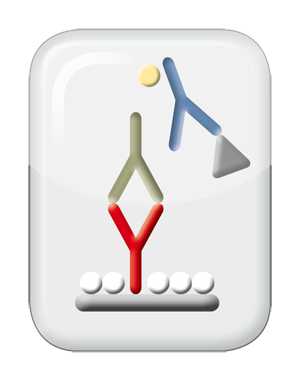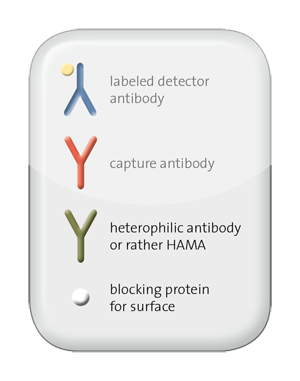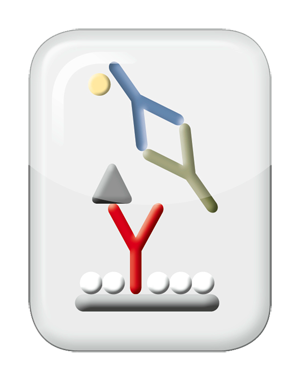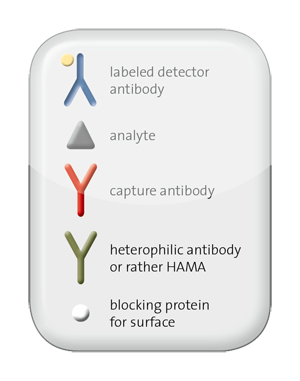Interference caused by antibodies from the sample
HAMA
Human anti-mouse antibodies (HAMA) are human antibodies which can bind specifically mouse antibodies. They originate from long-lasting contact to pets as well as from medication of therapeutic antibodies. HAMAs interfere with immunological methods working with mouse antibodies. Due to high sequence homology between different species, HAMA containing sera can also interfere with assays containing antibodies from other species.
Anti-animal-antibodies
Human anti-animal antibodies (HAAA) are generated after contact with animal immunglobulins. Therefore HAAAs can be found in blood of human patients. They can be IgG, IgA, IgM or IgE antibodies. HAAAs are important interfering substances in many diagnostical immunoassays. Up to 80% of all samples from patients can contain HAAAs (depending on published study). Some antibodies can bind the Fc fragment as well as the Fab fragment of the used antibody. Thus analyte binding is reduced or prevented. The consequence is a false negative result. HAAAs can also cause false positive results. One example is the cross linking of assay antibodies by HAAAs in the absence of analyte. The results are false positive signals. If a HAAAs binds to the Fc fragment of an antibody it is called an anti-isotypic antibody. An anti-idiotypic antibody binds directly to the highly variable region of the Fab fragment.
Heterophilic antibodies
Heterophilic antibodies are antibodies which can cross-react with several antigens. They can bind not only to the specific antigen but also to many other antigens too. They are multispecific antibodies of the early immune response or interfering antibodies with unknown origin. They can be IgG, IgA, IgM or IgE antibodies. Especially IgM play a key role in sera from rheumatic patients. These antibodies can bind Fc fragments of human antibodies. Thus they can also bind Fc fragments of the antibodies used in an assay. Rheumatic sera can connect capture and detector antibody with the result of false positive signals. The interfering heterophilic antibodies have normally low binding affinity. They interfere mainly with assays with low dilution of serum or plasma specimens due to low concentration of analyte.
Anti-idiotypic antibodies
Anti- idiotypic antibodies can bind directly to the highly variable region of the Fab fragment of another antibody.
They bind directly to the antigen binding site of the antibody.
Anti-idiotypic antibodies can therefore compete with the original antigens of other antibodies.
So they can cause different interference effects in immunoassays.








